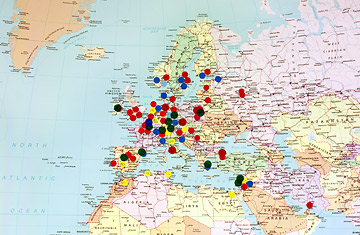
Britain is less than one half the size of France and only about two-thirds the size of Germany but, by the year 2060, it will have more people living in it than both countries, according to a new report by the research arm of the European Union, Eurostat.
Germany, home to the largest population in Europe since its reunification in 1989, will see its population decline from some 82 million today to 70 million in 2060, according to the study. Britain, as a result of higher immigration and more babies, will see its population rise to 77 million from 50 million over the same period. Other countries such as Ireland, Cyprus and Spain are expected to see sharp increases as well.
The projections are part of a broader analysis of European populations which also concludes that, if current demographic trends hold, the natural growth in population in the continent as a whole will end in just seven years time, when the number of deaths overtakes the number of births. Thanks to immigration the E.U.'s population will continue to grow to 520 million by 2035 before falling back to 506 million by 2060. (The U.S. population, according to another recent study, will increase over the same period from about 300 million today to 468 million in 2060, most of that increase coming as a result of immigration.)
The Eurostat study's most serious implications are for an aging population and the ability of European societies to pay for pensions for their elderly after they stop working. Today, there are three working-age Europeans for every one over 65. By 2060, that number will have fallen to one in two. "This is a big problem and countermeasures must be taken," Steffen Kroehnert, a demographic expert at the Berlin Institute for Population and Development says. His institute published similar projections earlier this month.
In countries losing their population, family-friendly policies that make it possible for women to work at the same time as bearing children might make a difference, he says. The lifting of restrictions on immigration for able workers could also help. "Countries like England, Ireland and Sweden, which are seeing population increases, have a relatively open labor market while Germany still makes it difficult for people to immigrate," says Kroehnert. In Britain, however, the projections have triggered calls for tighter immigration controls.
The steepest population declines are expected in eastern Europe, where countries such as Bulgaria and Poland could lose up to one quarter of their populations, according to the study. These losses are the result of "a combination of economic differences and relative freedom of movement," as well as reduced fertility, says Kroehnert. He noted that women in eastern Europe under communism were accustomed to working and continued to do so after the fall of the Berlin Wall. But with weakened social support networks for raising children, many began putting off child bearing until later years or gave it up altogether. The sharpest population decline in a single country in all Europe is Bulgaria, where a combination of falling employment levels and relative ease of migration to western Europe is emptying some regions of working men and women. By 2060, its current population of 7.6 million will be down to 5.4 million, a drop of 28%.
Eurostat researchers caution that their projections are a "what if" scenario and do not take into account future changes in immigration policy or fertility rates that could alter the outcome. But Kroehnert says that in the case of declining birth rates, it will be difficult to make up for them simply by adjusting policy. In many cases the decline has its roots in developments over several decades, he says. Making up for a decline in number of babies by, say, 300,000 by admitting 300,000 more immigrants "who have to be integrated" isn't realistic, he says. "It's impossible to balance out the decline in births completely." With reporting by Stephanie Kirchner/Berlin
